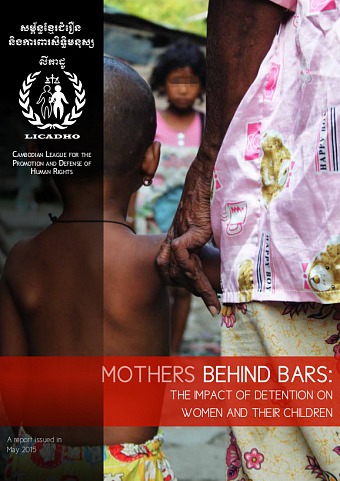Mothers Behind Bars: The Impact of Detention on Women and their Children
Published on 26 May 2015Today, LICADHO releases its report “Mothers Behind Bars: The Impact of Detention on Women and their Children” which seeks to raise awareness of the harmful, and sometimes devastating, impact a mother’s imprisonment can have on her children.
The report finds that authorities, in particular judges and prosecutors, can dramatically improve the lives of many children by properly complying with existing legal procedures to reduce the number of mothers who are detained unnecessarily.
“Each year hundreds of children are separated from their mothers for no good reason and their lives can fall apart as a result. Yet for many this suffering is easily avoidable,” said LICADHO President, Pung Chhiv Kek.
This report comes in the wake of amnesties provided to many pregnant women and women with children in prison in March and April 2015. These releases were called for by Prime Minister Hun Sen following the release of LICADHO’s report, “Childhood behind bars: Growing up in a Cambodian prison – Dara’s story,” which detailed the story of a boy who suffered severe developmental delays after spending the first three years of his life in prison with his mother.
Whilst the recent amnesties spared some children from further time in prison, viable long-term solutions cannot be achieved through yearly amnesties, instead they must be sought through systematic changes
Whereas “Dara’s Story” focused on the impact of prison life on the development of a child, the current report looks at the impact of a mother’s detention on their children living outside of prison. LICADHO’s research reveals that the welfare of children is routinely ignored, not only at arrest, but throughout the whole judicial process.
When a mother is sent to prison the psychological and developmental consequences for her children can be deep and long-lasting. The child’s education and health almost always suffer as a result and siblings are often separated. The financial costs associated with imprisonment can also be debilitating, resulting in the loss of entire livelihoods for some families.
LICADHO’s findings are particularly disconcerting given that many women are imprisoned unnecessarily and, whilst steps have been taken in recent years to promote rehabilitative imprisonment, pre-trial detention alternatives, and non-custodial sentences, implementation has proceeded slowly at best.
The Cambodian penal system continues to treat pre-trial detention as the norm rather than the exception, contrary to Cambodia’s Code of Criminal Procedure and many people convicted of minor offences, especially mothers and pregnant women, are sent to prison without any consideration of non-custodial alternatives.
LICADHO also found that immediate changes must be made to the system of prison visits in Cambodia to allow for children to visit their mothers regularly, with as much privacy as possible and without unnecessary restrictions on physical contact. As it is, many children are unable to visit their mothers at all due to the prohibitive prison visit costs.
“Whilst the recent amnesties spared some children from further time in prison, viable long-term solutions cannot be achieved through yearly amnesties, instead they must be sought through systematic changes, especially in court procedures,” said LICADHO Prison Project Supervisor, Nou Sam An.
The Prime Minister himself appeared to recognise the need for broader reforms, calling on the Ministries of Justice and Interior to discuss long-term solutions to protect the welfare of the children with incarcerated mothers. The ministries, however, have not noticeably responded to this call for long-term solutions with the same vigor they showed in responding to the call for amnesties.
LICADHO urges authorities to consider the impact of a mother’s imprisonment on her children outside prison and pay serious attention to alternatives to prison for this priority group. By properly implementing existing judicial procedures they can enable children to remain with their mothers, preserve family units and protect children’s chances of a good education. In the absence of alternative measures, thousands of children across Cambodia will continue to suffer the consequences of harsh, unnecessary detention policies.
For more information, please contact:
▪ Dr. Pung Chhiv Kek, LICADHO President, 012 802 506 [English, French, Khmer]
▪ Ms. Nou Sam An, LICADHO Prison Project Supervisor, 012 493 287 [Khmer]
PDF: Download full statement in English - Download full statement in Khmer
MP3: Listen to audio version in Khmer








